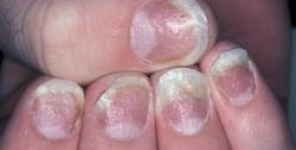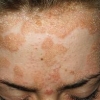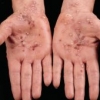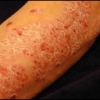Acitretina nel trattamento della psoriasi volgare
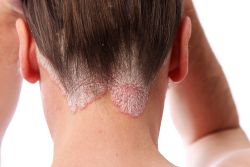 Le cellule T-helper (Th), comprese le cellule Th1, Th2 e Th17, possono giocare un ruolo importante nella patogenesi della psoriasi volgare (PV). L'acitretina è un trattamento efficace per la PV; ma la sua influenza sulle cellule Th, durante il trattamento della PV, non è tuttora chiaro.
Le cellule T-helper (Th), comprese le cellule Th1, Th2 e Th17, possono giocare un ruolo importante nella patogenesi della psoriasi volgare (PV). L'acitretina è un trattamento efficace per la PV; ma la sua influenza sulle cellule Th, durante il trattamento della PV, non è tuttora chiaro.
Questo studio ha lo scopo di indagare l'influenza dell'acitretina sulle cellule Th1, Th2 e sulle cellule Th17, nei pazienti con PV. I pazienti PV (n = 30) hanno ricevuto acitretina p.o. (20 mg/die) per 8 settimane. Sono state eseguite le biopsie del siero e della pelle, prima e dopo il trattamento. È stata utilizzata l'immunofluorescenza di doppia marcatura per analizzare le cellule T, Th1, Th2 e Th17 nelle lesioni cutanee.
Il saggio immuno-assorbente legato ad un enzima e il western blot sono stati utilizzati per analizzare le espressioni di interferone (IFN)-γ, di interleuchina (IL)-4 e di IL-17 nel siero e nelle lesioni cutanee. Sono state rilevate le espressioni di mRNA di IFN-γ, mRNA di IL-4 e mRNA di IL-17 nelle lesioni cutanee, mediante l'ibridazione in situ. L'acitretina ha diminuito la quantità di cellule T, Th1 e Th17 nelle lesioni da PV, ma non ha avuto alcuna influenza significativa sulle cellule Th2.
L'acitretina ha anche ridotto l'espressione di IFN-γ e di IL-17 nel siero e nelle lesioni. Le espressioni in mRNA di IFN-γ e IL-17 sono diminuite significativamente dopo 8 settimane di terapia.
Tuttavia, l'acitretina non ha avuto alcuna influenza significativa sull'espressione della proteina e dell'mRNA di IL-4. In una certa misura, l'acitretina può invertire la preponderanza di Th1 e Th17 nei pazienti con PV.
Ciò può essere dovuto al meccanismo dell'acitretina su PV; tuttavia, le cellule Th2 non sono state influenzate dal trattamento all'acitretina.
Storia della pubblicazione:
Titolo: Acitretin exerted a greater influence on T-helper (Th)1 and Th17 than on Th2 cells in treatment of psoriasis vulgaris
Rivista: The Journal of Dermatology. doi: 10.1111/j.1346-8138.2012.01637.x
Autori: Xinwu NIU, Wei CAO, Huiqun MA, Jie FENG, Ximei LI, Xinhua ZHANG
Affiliazioni: Department of Dermatology, The Second Affiliated Hospital of Medical College of Xi'an JiaoTong University, Xi'an, China
Department of Dermatology, Baoji Central Hospital, Baoji, China
Abstract:
T-helper (Th) cells, including Th1, Th2 and Th17 cells, may play an important role in the pathogenesis of psoriasis vulgaris (PV). Acitretin is an effective treatment for PV; however, its influence on Th cells during the treatment of PV is unclear. This study aimed to investigate the influence of acitretin on Th1, Th2 and Th17 cells in PV patients. PV patients (n = 30) received acitretin p.o. (20 mg/day) for 8 weeks. Sera and skin biopsies were obtained before and after treatment. Double-labeled immunofluorescence was used to analyze T, Th1, Th2 and Th17 cells in skin lesions. Enzyme-linked immunosorbent assay and western blot were used to analyze the expressions of interferon (IFN)-γ, interleukin (IL)-4 and IL-17 in sera and skin lesions. The expressions of IFN-γ mRNA, IL-4 mRNA and IL-17 mRNA in skin lesions were detected by in situ hybridization. Acitretin decreased the quantity of T, Th1 and Th17 cells in PV lesions, but had no significant influence on Th2 cells. Acitretin also decreased the expression of IFN-γ and IL-17 in serum and lesions. The expressions of IFN-γ mRNA and IL-17 mRNA decreased significantly after 8 weeks of therapy. However, acitretin had no significant influence on the expression of IL-4 protein and mRNA. Acitretin can reverse Th1 and Th17 preponderance in PV patients to some degree. This may be due to the mechanism of acitretin on PV; however, Th2 cells were not affected by acitretin treatment.
